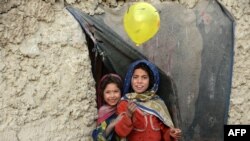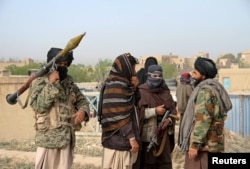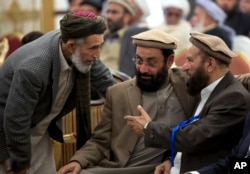Russia, Pakistan and China will hold the next round of three-way counterterrorism talks in Moscow December 27, primarily focusing on turmoil-hit Afghanistan.
Russian Ambassador to Islamabad Alexey Dedov disclosed the details in an interview to state-run Pakistani radio.
This will be the third meeting of the “trilateral working group on Afghanistan,” he said, following meetings in Beijing and Islamabad.
“What we see in Afghanistan, unfortunately, is worrisome because it does not bring us optimism. There is a lack of three crucial elements; that is a stable self-sufficient economy, good governance and strong army,” observed Dedov.
A deterioration in security and the emergence of Islamic State affiliates in volatile border regions of Afghanistan have necessitated the trilateral consultations with an aim to form a “regional anti-terrorism structure” to counter “spillover effects” of terrorism, insist Pakistani, Russian and Chinese officials.
The Taliban insurgency in the outgoing year opened new warfronts against Afghan security forces in several northern provinces, which border former Soviet Central Asian states.
Moscow is worried that growing insecurity in northern Afghanistan will encourage IS to export terrorism to Russia and China through the Central Asian region.
“In partidular we are especially concerned about the growth of Daesh (Arabic acronym for IS), which are proliferating their influence to some northern areas of Afghanistan, which directly border territories of our allies in our brotherly Central Asian republics,” he added.
Dedov rejected media reports as” fantasies” that Russia is assisting the Taliban in the fight against U.S.-led forces in Afghanistan.
“We have never ever provided any kind of assistance to (the) Taliban,” the ambassador said. Instead, he said, Russia is assisting the Afghan government and has granted “some light weapons” to its forces and is running programs to train Afghan police and military personnel in Russian institutions.
Dedov added that Moscow strongly supports the Afghan peace and reconciliation process, saying improvement in the situation in security in Afghanistan is in the interest of Russia.
“But what we can see that the progress there (in Afghan peace efforts) is very difficult to be seen. That’s very pity. So, I think that will be a very good discussion in two weeks in Moscow on Afghan matters.”
Moscow has recently acknowledged it maintains “limited political” ties to the Taliban to ensure security of its citizens in the country and encourage the insurgents to engage in an Afghan peace process. The revelation has provoked strong Afghan criticism of Russia's "overt legitimacy" to the Taliban insurgency.
Russian officials also play down Kabul’s concerns that the trilateral meeting will discuss Afghanistan without its representation. They insist Moscow is engaged in other forums on the Afghan issue and terrorism where Pakistan and China are not invited.
Pakistan has witnessed an uptick in IS attacks in recent months, alleging loyalists of the Middle East-based terrorist group across its 2,600-kilometer porous Afghan border are behind the bloodshed.
For its part, China is worried that continued turmoil in Afghanistan and an emerging IS threat could undermine security in the restive northwestern Chinese border region of Xinjiang, where Muslim Uighur separatists are waging a low level insurgency.













